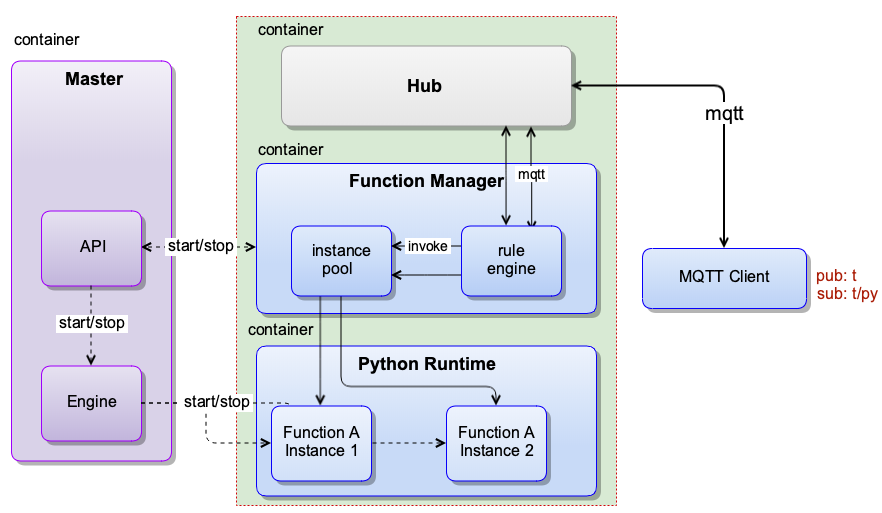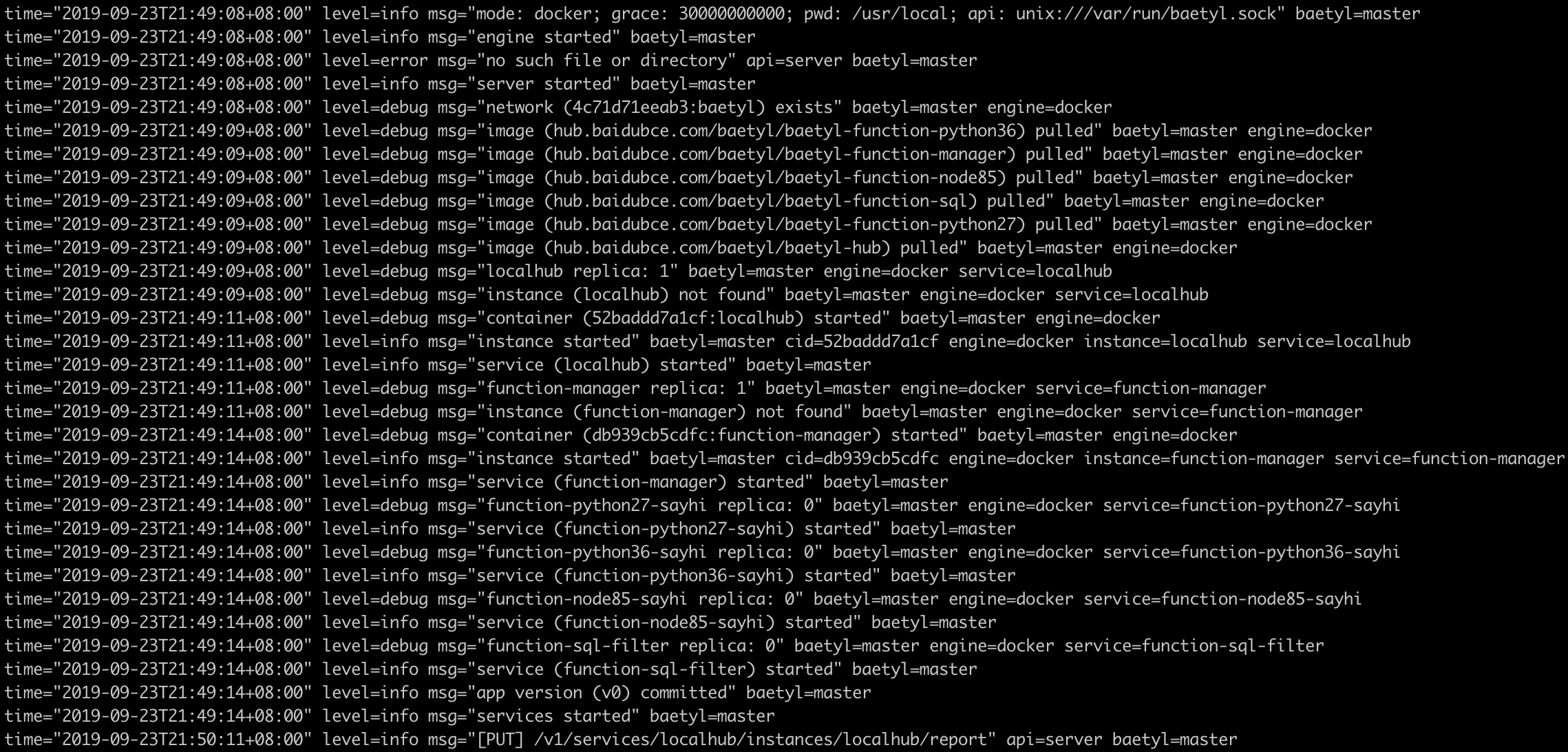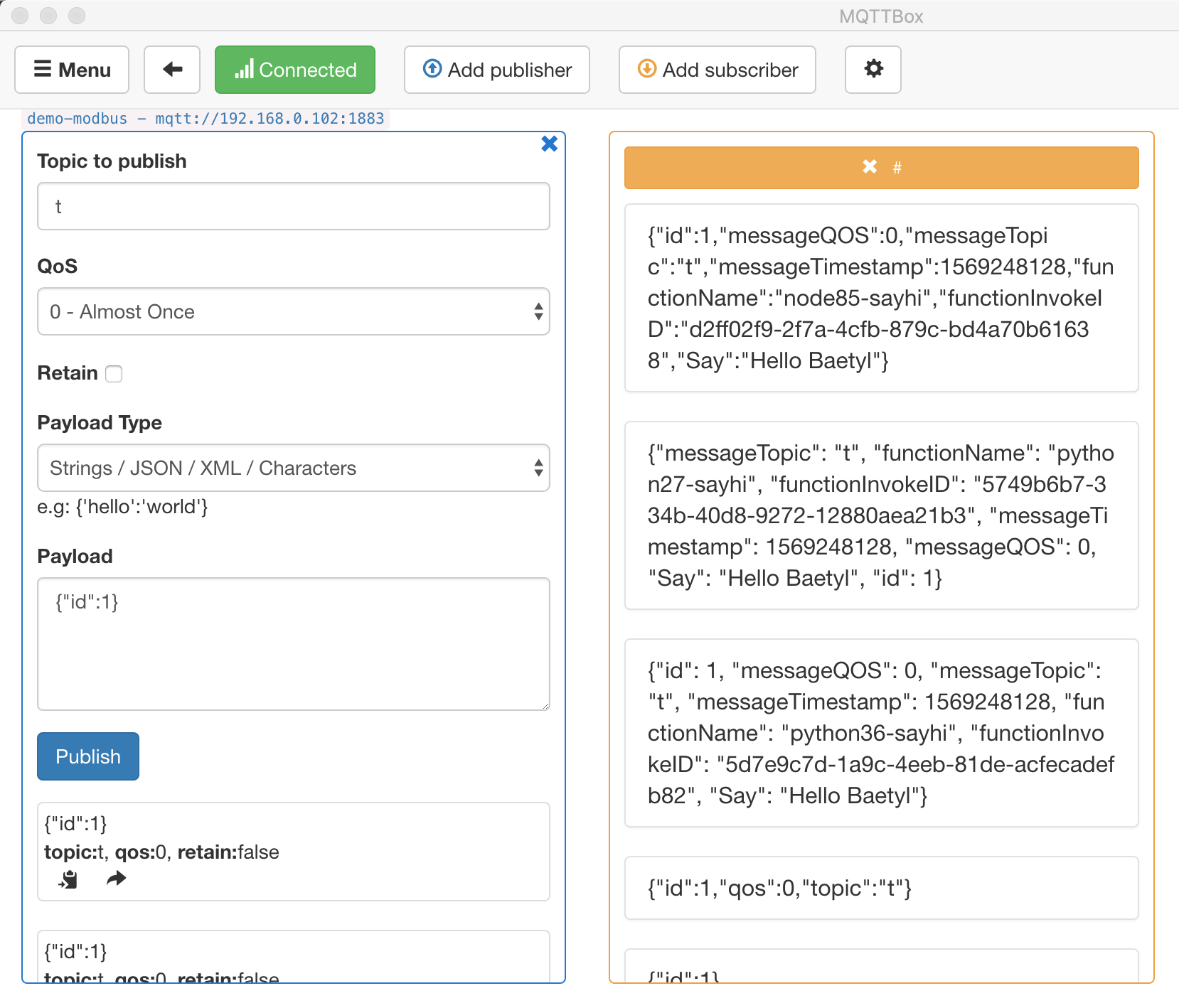Message handling with Function Service¶
Statement
- The operating system used in this test is Ubuntu 18.04
- The function runtime used in this test is Python3
- The MQTTBox is used as MQTT client in this test
NOTE: You can install Baetyl from source. Please refer to Install Baetyl from source for more details.
Different from the Hub service to transfer message among devices(mqtt clients), this document describes the message handling with Local Function Manager service(also include Hub service and Python3.6 runtime service). In the document, Hub service is used to establish connection between Baetyl and mqtt client, Python3.6 runtime service is used to handle MQTT messages, and the Local Function Manager service is used to combine Hub service with Python3.6 runtime service with message context.
This document will take the TCP connection method as an example to show the message handling, calculation and forwarding with Local Function Manager service.
Workflow¶
- Step 1: Install Baetyl and its example configuration, more details please refer to Quickly install Baetyl
- Step 2: Modify the configuration according to the usage requirements, and then execute
sudo systemctl start baetylto start the Baetyl in Docker container mode, or executesudo systemctl restart baetylto restart the Baetyl. Then execute the commandsudo systemctl status baetylto check whether baetyl is running. - Step 3: MQTTBox connect to Hub Service by TCP connection method, more detailed contents please refer to Device connect to Hub Service
- If connect successfully, then subscribe the MQTT topic due to the configuration of Hub Service, and observe the log of Baetyl.
- If the Baetyl’s log shows that the Python Runtime Service has been started, it indicates that the published message was handled by the specified function.
- If the Baetyl’s log shows that the Python Runtime Service has not been started, then retry it until the Python Runtime Service has been started.
- If connect unsuccessfully, then retry
Step 3operation until it connect successfully
- If connect successfully, then subscribe the MQTT topic due to the configuration of Hub Service, and observe the log of Baetyl.
- Step 4: Check the publishing and receiving messages via MQTTBox.
 Workflow of using Local Function Manager Service to handle MQTT messages
Workflow of using Local Function Manager Service to handle MQTT messages
Message Handling Test¶
If the Baetyl’s example configuration is installed according to Step 1, to modify the configuration of the application, Hub service and function services.
Change the Baetyl application configuration to the following configuration:
# /usr/local/var/db/baetyl/application.yml
version: v0
services:
- name: localhub
image: hub.baidubce.com/baetyl/baetyl-hub
replica: 1
ports:
- 1883:1883
mounts:
- name: localhub-conf
path: etc/baetyl
readonly: true
- name: localhub-data
path: var/db/baetyl/data
- name: localhub-log
path: var/log/baetyl
- name: function-manager
image: hub.baidubce.com/baetyl/baetyl-function-manager
replica: 1
mounts:
- name: function-manager-conf
path: etc/baetyl
readonly: true
- name: function-manager-log
path: var/log/baetyl
- name: function-python27-sayhi
image: hub.baidubce.com/baetyl/baetyl-function-python27
replica: 0
mounts:
- name: function-sayhi-conf
path: etc/baetyl
readonly: true
- name: function-sayhi-code
path: var/db/baetyl/function-sayhi
readonly: true
- name: function-python36-sayhi
image: hub.baidubce.com/baetyl/baetyl-function-python36
replica: 0
mounts:
- name: function-sayhi-conf
path: etc/baetyl
readonly: true
- name: function-sayhi-code
path: var/db/baetyl/function-sayhi
readonly: true
- name: function-node85-sayhi
image: hub.baidubce.com/baetyl/baetyl-function-node85
replica: 0
mounts:
- name: function-sayjs-conf
path: etc/baetyl
readonly: true
- name: function-sayjs-code
path: var/db/baetyl/function-sayhi
readonly: true
- name: function-sql-filter
image: hub.baidubce.com/baetyl/baetyl-function-sql
replica: 0
mounts:
- name: function-filter-conf
path: etc/baetyl
readonly: true
volumes:
# hub
- name: localhub-conf
path: var/db/baetyl/localhub-conf
- name: localhub-data
path: var/db/baetyl/localhub-data
- name: localhub-cert
path: var/db/baetyl/localhub-cert-only-for-test
- name: localhub-log
path: var/db/baetyl/localhub-log
# function
- name: function-manager-conf
path: var/db/baetyl/function-manager-conf
- name: function-manager-log
path: var/db/baetyl/function-manager-log
- name: function-sayhi-conf
path: var/db/baetyl/function-sayhi-conf
- name: function-sayhi-code
path: var/db/baetyl/function-sayhi-code
- name: function-sayjs-conf
path: var/db/baetyl/function-sayjs-conf
- name: function-sayjs-code
path: var/db/baetyl/function-sayjs-code
- name: function-filter-conf
path: var/db/baetyl/function-filter-conf
Change the Baetyl Hub service configuration to the following configuration:
# /usr/local/var/db/baetyl/localhub-conf/service.yml
listen:
- tcp://0.0.0.0:1883
principals:
- username: test
password: hahaha
permissions:
- action: 'pub'
permit: ['#']
- action: 'sub'
permit: ['#']
subscriptions:
- source:
topic: 't'
target:
topic: 't/topic'
logger:
path: var/log/baetyl/service.log
level: "debug"
The configuration of the Baetyl local function services do not need to be modified. The specific configuration is as follows:
# /usr/local/var/db/baetyl/function-manager-conf/service.yml
hub:
address: tcp://localhub:1883
username: test
password: hahaha
rules:
- clientid: func-python27-sayhi-1
subscribe:
topic: t
function:
name: python27-sayhi
publish:
topic: t/py2hi
- clientid: func-sql-filter-1
subscribe:
topic: t
qos: 1
function:
name: sql-filter
publish:
topic: t/sqlfilter
qos: 1
- clientid: func-python36-sayhi-1
subscribe:
topic: t
function:
name: python36-sayhi
publish:
topic: t/py3hi
- clientid: func-node85-sayhi-1
subscribe:
topic: t
function:
name: node85-sayhi
publish:
topic: t/node8hi
functions:
- name: python27-sayhi
service: function-python27-sayhi
instance:
min: 0
max: 10
- name: sql-filter
service: function-sql-filter
- name: python36-sayhi
service: function-python36-sayhi
- name: node85-sayhi
service: function-node85-sayhi
logger:
path: var/log/baetyl/service.log
level: "debug"
# /usr/local/var/db/baetyl/function-filter-conf/service.yml
functions:
- name: sql-filter
handler: 'select qos() as qos, topic() as topic, * where id < 10'
# /usr/local/var/db/baetyl/function-sayhi-conf/service.yml
functions:
- name: 'python27-sayhi'
handler: 'index.handler'
codedir: 'var/db/baetyl/function-sayhi'
- name: 'python36-sayhi'
handler: 'index.handler'
codedir: 'var/db/baetyl/function-sayhi'
# /usr/local/var/db/baetyl/function-sayjs-conf/service.yml
functions:
- name: 'node85-sayhi'
handler: 'index.handler'
codedir: 'var/db/baetyl/function-sayhi'
Python function code does not need to be changed. /usr/local/var/db/baetyl/function-sayhi-code/index.py is implemented as follows:
#!/usr/bin/env python
# -*- coding:utf-8 -*-
"""
function to say hi in python
"""
def handler(event, context):
"""
function handler
"""
res = {}
if isinstance(event, dict):
if "err" in event:
raise TypeError(event['err'])
res = event
elif isinstance(event, bytes):
res['bytes'] = event.decode("utf-8")
if 'messageQOS' in context:
res['messageQOS'] = context['messageQOS']
if 'messageTopic' in context:
res['messageTopic'] = context['messageTopic']
if 'messageTimestamp' in context:
res['messageTimestamp'] = context['messageTimestamp']
if 'functionName' in context:
res['functionName'] = context['functionName']
if 'functionInvokeID' in context:
res['functionInvokeID'] = context['functionInvokeID']
res['Say'] = 'Hello Baetyl'
return res
The Node function code does not need to be changed. /usr/local/var/db/baetyl/function-sayjs-code/index.js is implemented as follows:
#!/usr/bin/env node
const hasAttr = (obj, attr) => {
if (obj instanceof Object && !(obj instanceof Array)) {
if (obj[attr] != undefined) {
return true;
}
}
return false;
};
const passParameters = (event, context) => {
if (hasAttr(context, 'messageQOS')) {
event['messageQOS'] = context['messageQOS'];
}
if (hasAttr(context, 'messageTopic')) {
event['messageTopic'] = context['messageTopic'];
}
if (hasAttr(context, 'messageTimestamp')) {
event['messageTimestamp'] = context['messageTimestamp'];
}
if (hasAttr(context, 'functionName')) {
event['functionName'] = context['functionName'];
}
if (hasAttr(context, 'functionInvokeID')) {
event['functionInvokeID'] = context['functionInvokeID'];
}
};
exports.handler = (event, context, callback) => {
// support Buffer & json object
if (Buffer.isBuffer(event)) {
const message = event.toString();
event = {}
event["bytes"] = message;
}
else if("err" in event) {
return callback(new TypeError(event['err']))
}
passParameters(event, context);
event['Say'] = 'Hello Baetyl'
callback(null, event);
};
As configured above, if the MQTTBox has established a connection with the Hub service based on the above configuration, a message with the topic t is sent to the Hub, and the function service will route the message to python27-sayhi, python36-sayhi, node85-sayhi and sql-filter functions to process, and messages with topic t/py2hi, t/py3hi, t/node8hi, and t/sqlfilter are output separately. At this time, the MQTT client subscribed to the topic # will receive these messages, as well as the original message t and the message with topic t/topic which is renamed by Hub service directly .
NOTE: Any function that appears in the rules configuration must be configured in the functions configuration, otherwise the function runtime instances can not be started normally.
Baetyl Start¶
According to Step 2, execute sudo systemctl start baetyl to start Baetyl in Docker mode and then execute the command sudo systemctl status baetyl to check whether baetyl is running.
Look at the log of the Baetyl master by executing sudo tail -f -n 40 /usr/local/var/log/baetyl/baetyl.log as shown below:
 Baetyl start
Baetyl start
Also, we can execute the command docker ps to view the list of docker containers currently running.
 View the list of docker containers currently running
View the list of docker containers currently running
After comparison, it is not difficult to find that the Hub service and the function service have been successfully loaded when Baetyl starts. The function runtime instance is not started because the function runtime instance is dynamically started by function service when a message is triggered.
MQTTBox Establish Connection¶
In this test, we configured the connection information of MQTTBox by TCP connection, and then clicked the Add subscriber button to subscribe to the topic #, which is used to receive all messages received by the Hub services.
Message Handling Check¶
By looking at the /usr/local/var/db/baetyl/function-sayhi-code/index.py code file, you can see that after receiving a message, the function handler will perform a series of processes and return the result. The returned results include some context information, such as messageTopic, functionName, and so on.
Here, we publish the message {"id":1} with the topic t to Hub service via MQTTBox, and then observe the receiving messages as follows.
 MQTTBox received messages
MQTTBox received messages
After sending the message, we quickly execute the command docker ps to see the list of the currently running containers. All function runtime service instances are started. The result is shown below.
 View the list of docker containers
View the list of docker containers
In summary, we simulated the process of local processing of messages through the Hub service and function services. It can be seen that the framework is very suitable to process message flows at edge.